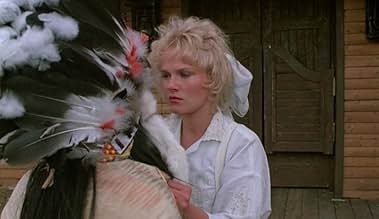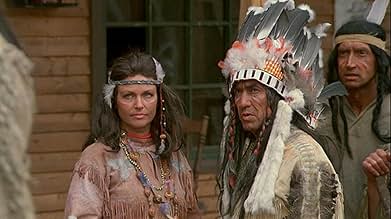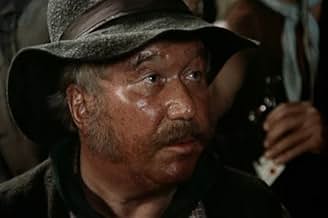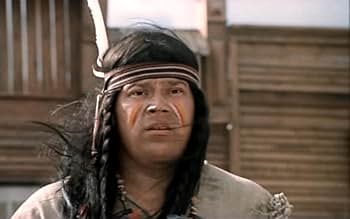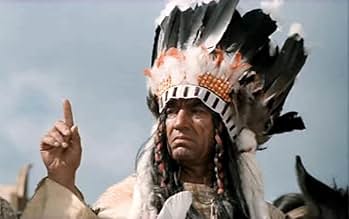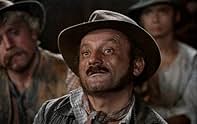IMDb-BEWERTUNG
7,6/10
3711
IHRE BEWERTUNG
Füge eine Handlung in deiner Sprache hinzuMr Jonny First arrives to the Wild West to present the art of the Cinematograph.Mr Jonny First arrives to the Wild West to present the art of the Cinematograph.Mr Jonny First arrives to the Wild West to present the art of the Cinematograph.
- Auszeichnungen
- 2 Nominierungen insgesamt
Aleksandra Yakovleva
- Ms. Diana Little
- (as Aleksandra Asmaye)
Nikolay Karachentsov
- Billy King
- (as N. Karachentsov)
Igor Kvasha
- Pastor
- (as I. Kvasha)
Lev Durov
- Grobovshchik
- (as L. Durov)
Galina Polskikh
- Mrs. Thompson
- (as G. Polskikh)
Natalya Krachkovskaya
- Conchita
- (as N. Krachkovskaya)
Natalya Fateeva
- Zhena vozhdya
- (as N. Fateyeva)
Spartak Mishulin
- Vozhd indeytsev
- (as S. Mishulin)
Albert Filozov
- Mr. Second
- (as A. Filozov)
Oleg Anofriev
- Tapyor
- (as O. Anorfriyev)
Mikhail Svetin
- Aptekar
- (as M. Svetin)
Leonid Yarmolnik
- Martin
- (as L. Yarmolnik)
Semyon Farada
- Mr. Thompson
- (as S. Farada)
Aleksandr Pavlov
- Usatyy kovboy
- (as A. Pavlov)
Yuriy Medvedev
- Staffi
- (as Yu. Medvedev)
Handlung
WUSSTEST DU SCHON:
- WissenswertesThe most successful film at the box office that was released in the USSR in 1987.
- Zitate
Cowboy: I am not going to talk to this ape with a painted face!
Chief of Comanches: I forgive the pale face. He has not heard of Sir Charles Darwin and does not know that ape is our common ancestor.
- VerbindungenFeatured in Oleg Tabakov. Smotryu na mir vlyublyonnymi glazami (2015)
Ausgewählte Rezension
"The Man from Capuchin Boulevard" is without a doubt an extraordinary film. This is a movie with a capital letter, which takes exactly its unique atmosphere and memorable plot. The Soviet western sends the viewer to enjoy a kind of interpretation of the origin of cinema in the Wild West. And the entire film crew, and especially the brilliant acting of the actors, will allow you to plunge into the fascinating and sometimes touching world of the distant past on another continent.
The film was one of the last appearances in the cinema of the talented actor Andrey Mironov. In the year of release - 1987 - the artist was gone. An incredible loss for the entire national cinema. I'm sure Mironov could give us a dozen more memorable images. Perhaps because the role in this film was one of the last, I remember it so well. The actor created a unique image of Johnny First. A true gentleman, a missionary from cinema, a very polite and positive character from all sides, who is designed to introduce the masses to an amazing revolutionary phenomenon - cinema. The picture will show how interesting and with very funny adventures the hero will take up this event.
There are many other actors of the first magnitude in the film, who also successfully merge into this picture: Oleg Tabakov, Nikolai Karachentsov, Mikhail Boyarsky, Alexandra Yakovleva, Igor Kvasha, Lev Durov and many, many others. Each of the artists, regardless of screen time, elegantly fits into the created world, creating that unique atmosphere that the viewer enjoys throughout the narrative. Black Jack, played by Boyarsky, contrasts sharply with his usual image of D'Artagnan. Great performance: absolutely different charisma, piercing gaze and literally animal danger emanating from the hero. Karachentsov and his Billy are a magnificent demonstration of the transformation of a gangster into a polite... gangster. Bartender Harry is another opportunity for actor Tabakov to transform into an extraordinary personality and really get into the image. Kvasha was pleased with a superbly worked-out hero pastor, and Spartak Mishulin became a pleasant-looking Indian leader. Alexandra Yakovleva and her Diana Little have become the personification of new assumptions in cinema. The actress presented an unforgettable image of a sexually liberated heroine. Watching her, I constantly wondered how such a thing was allowed on the screens in those days. But it was a great image.
The film was released in 1987. The time of Perestroika, new trends, new hopes, new opportunities in the cinema. On the screen you can see something unusual that inspires a certain freedom. Experiments and unexpected solutions are acceptable, which the viewer necessarily notices. At the same time, capitalist values are ridiculed quite interestingly in the picture, as if reminding us that we are still watching Soviet cinema. There are also a lot of other cliches from that time and place, which, in my opinion, are perfectly ridiculed. The authors well demonstrate frank laughter at Western westerns, successfully beating what could really be seen in those pictures. Here you have constant quarrels, fights, and shooting. Without this, it seems, nowhere. However, the creators joke funny enough for the domestic viewer, you definitely get pleasure.
The picture is full of various fights, songs, shooting, dancing, explosions, sparkling humor. In this picture, all this is successfully woven into an interesting plot. It feels like the creators really wanted to surprise the viewer and make the film memorable for a long time. What to say. They did it well. And some quotes are still used in our society.
"The Man from Capuchin Boulevard" is a landmark movie, an epoch-making picture that will surely please the audience today. This is an unshakable classic, a symbol of the era, of the time when it began to seem that once in the domestic cinema you can see such freedom of thought and performance, then all this will soon be in society. And even though what was happening in reality was happening, this film became an obvious victory of its time. An extraordinary picture, an amazing acting game, a gorgeous story that you sometimes want to revisit again.
9 out of 10.
The film was one of the last appearances in the cinema of the talented actor Andrey Mironov. In the year of release - 1987 - the artist was gone. An incredible loss for the entire national cinema. I'm sure Mironov could give us a dozen more memorable images. Perhaps because the role in this film was one of the last, I remember it so well. The actor created a unique image of Johnny First. A true gentleman, a missionary from cinema, a very polite and positive character from all sides, who is designed to introduce the masses to an amazing revolutionary phenomenon - cinema. The picture will show how interesting and with very funny adventures the hero will take up this event.
There are many other actors of the first magnitude in the film, who also successfully merge into this picture: Oleg Tabakov, Nikolai Karachentsov, Mikhail Boyarsky, Alexandra Yakovleva, Igor Kvasha, Lev Durov and many, many others. Each of the artists, regardless of screen time, elegantly fits into the created world, creating that unique atmosphere that the viewer enjoys throughout the narrative. Black Jack, played by Boyarsky, contrasts sharply with his usual image of D'Artagnan. Great performance: absolutely different charisma, piercing gaze and literally animal danger emanating from the hero. Karachentsov and his Billy are a magnificent demonstration of the transformation of a gangster into a polite... gangster. Bartender Harry is another opportunity for actor Tabakov to transform into an extraordinary personality and really get into the image. Kvasha was pleased with a superbly worked-out hero pastor, and Spartak Mishulin became a pleasant-looking Indian leader. Alexandra Yakovleva and her Diana Little have become the personification of new assumptions in cinema. The actress presented an unforgettable image of a sexually liberated heroine. Watching her, I constantly wondered how such a thing was allowed on the screens in those days. But it was a great image.
The film was released in 1987. The time of Perestroika, new trends, new hopes, new opportunities in the cinema. On the screen you can see something unusual that inspires a certain freedom. Experiments and unexpected solutions are acceptable, which the viewer necessarily notices. At the same time, capitalist values are ridiculed quite interestingly in the picture, as if reminding us that we are still watching Soviet cinema. There are also a lot of other cliches from that time and place, which, in my opinion, are perfectly ridiculed. The authors well demonstrate frank laughter at Western westerns, successfully beating what could really be seen in those pictures. Here you have constant quarrels, fights, and shooting. Without this, it seems, nowhere. However, the creators joke funny enough for the domestic viewer, you definitely get pleasure.
The picture is full of various fights, songs, shooting, dancing, explosions, sparkling humor. In this picture, all this is successfully woven into an interesting plot. It feels like the creators really wanted to surprise the viewer and make the film memorable for a long time. What to say. They did it well. And some quotes are still used in our society.
"The Man from Capuchin Boulevard" is a landmark movie, an epoch-making picture that will surely please the audience today. This is an unshakable classic, a symbol of the era, of the time when it began to seem that once in the domestic cinema you can see such freedom of thought and performance, then all this will soon be in society. And even though what was happening in reality was happening, this film became an obvious victory of its time. An extraordinary picture, an amazing acting game, a gorgeous story that you sometimes want to revisit again.
9 out of 10.
- alekspredator87
- 20. Aug. 2022
- Permalink
Top-Auswahl
Melde dich zum Bewerten an und greife auf die Watchlist für personalisierte Empfehlungen zu.
- How long is A Man from Boulevard des Capucines?Powered by Alexa
Details
- Erscheinungsdatum
- Herkunftsland
- Sprache
- Auch bekannt als
- A Man from Boulevard des Capucines
- Produktionsfirma
- Weitere beteiligte Unternehmen bei IMDbPro anzeigen
Zu dieser Seite beitragen
Bearbeitung vorschlagen oder fehlenden Inhalt hinzufügen

Oberste Lücke
By what name was Chelovek s bulvara Kaputsinov (1987) officially released in Canada in English?
Antwort
